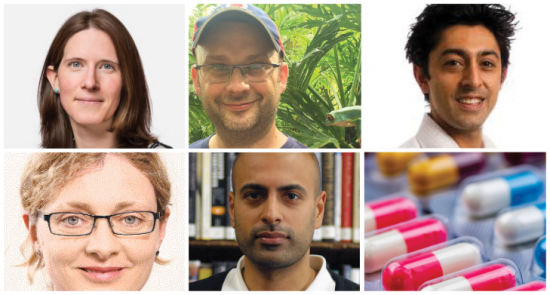News
150 people from around the world tune in for the first ever virtual Policy Lates event
- Details
- 27 May 2020
More than 150 people joined a panel of experts online to discuss the challenges and potential solutions to antimicrobial resistance (AMR), as part of the RSB’s Policy Lates series.
The event, held via Zoom on 21st May, was the first time a Policy Lates event has been hosted entirely online, in accordance with current safety recommendations for the COVID-19 pandemic.
With the change of setting, and the high number of people signing up, we were able to increase the audience capacity. 150 people joined the event via Zoom from across the world, including the UK, Brazil, Australia and the Netherlands.

Panel members from left corner clockwise: Becky Sugden, Professor Paul Hoskisson, Dr Sanjay Patel, Professor Katharina Stark, Dr Osman Dar
The event saw a panel of experts discussing what AMR is, how One Health approaches can bring communities together to tackle this complex issue, their work as part of these initiatives, and how AMR challenges and solutions are relevant to the current COVID-19 pandemic.
The event was chaired by RSB Council member Professor Paul Hoskisson FRSB from the University of Strathclyde. The panel consisted of Dr Osman Dar from Chatham House and Public Health England; Becky Sugden from the Wellcome Trust; Professor Katharina Stärk from the Swiss Federal Food Safety and Veterinary Office; and Dr Sanjay Patel from the University Hospital Southampton and the British Society for Antimicrobial Chemotherapy.
Dar discussed the challenges of AMR on a global level, including how different countries are tackling the issue, and how to ensure AMR remains a priority, whilst Sugden discussed the Wellcome Trust’s research on the policies surrounding AMR and their impact.
Stark discussed the link between AMR challenges and antimicrobial use in livestock and pets, whilst Patel talked about bridging the gap between AMR policy and the reality of prescribing and using antibiotics to treat people; expanding on the social science considerations needed to tackle AMR.
The audience then posed questions to the panel including how to manage emerging pathogens, how infections jump between species, and of course, how AMR may be affected by the COVID-19 pandemic and vice versa.
One of the big take home messages was that in reality, more people worldwide are still dying due to lack of access to antibiotics than because of AMR, so more also has to be done “from the ground up” to improve healthcare infrastructure.
Dr Laura Marshall MRCVS MRSB, head of science policy at the RSB, said of the event: “Antimicrobial resistance has a huge, international, negative impact on both public and animal health and welfare, and on the health of the ecosystems we all depend on. To scope how wide-ranging the effects of AMR are, this event had a ‘one health’ focus: bringing together experts across a diverse range of sectors to share collaborative approaches and solutions.
“Collaboration is key to tackling a range of global challenges, including the current COVID-19 pandemic. The Royal Society of Biology, through its diverse membership and member organisations, including those who partnered with us to deliver this event, strives to bring areas of the biosciences together to help face these challenges head on.”
The online discussion will be available on the Royal Society of Biology YouTube shortly.
This year our Policy Lates series is supported by the Biochemical Society, British Pharmacological Society, Society for Applied Microbiology, Society for Experimental Biology, and The Physiological Society.

